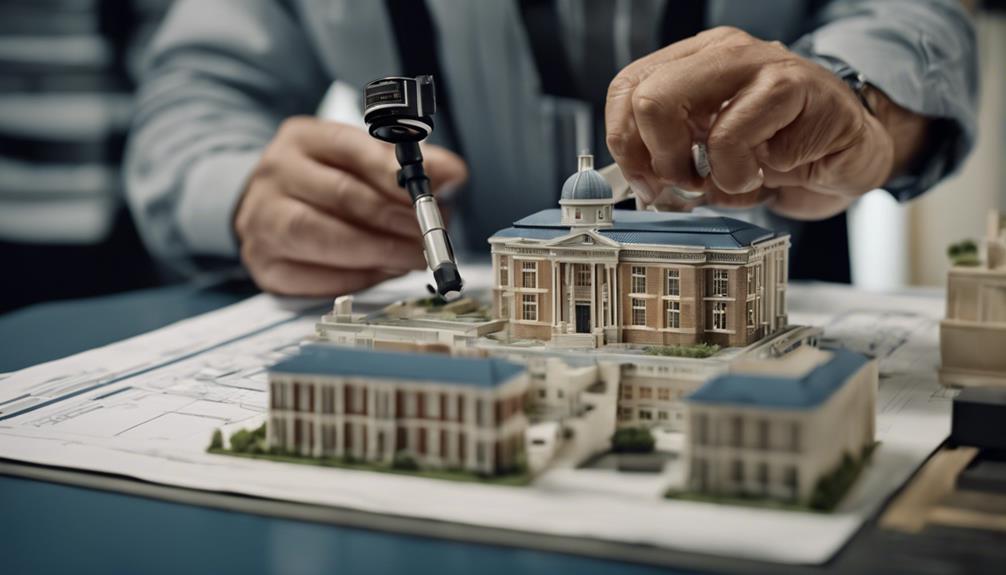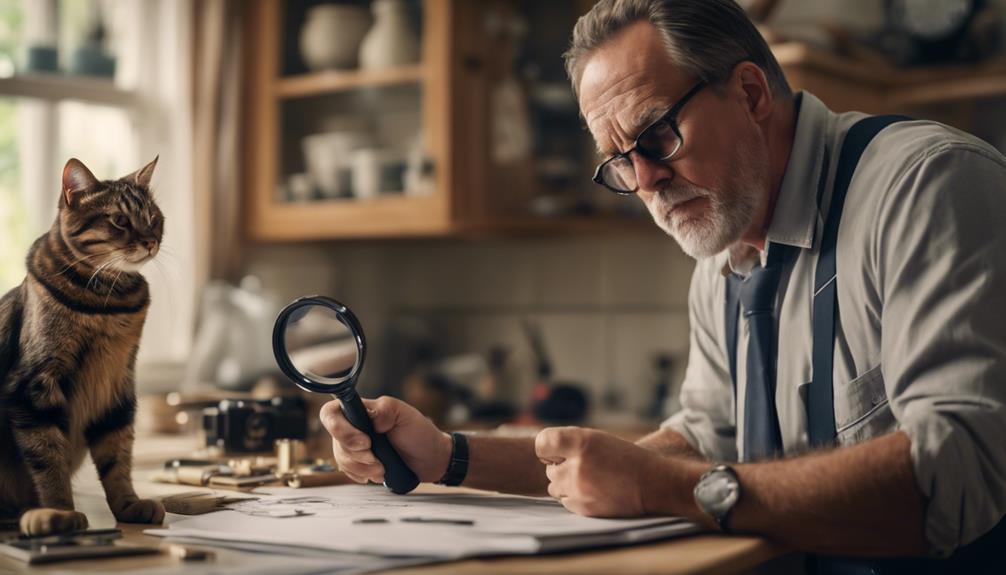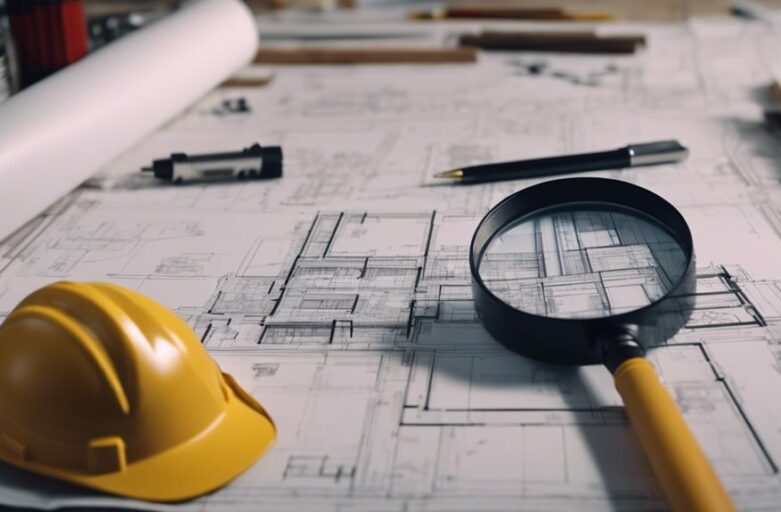Begin your building check-up by hiring a trained expert. Always keep important papers like building plans and old check-up reports nearby. Know the rules about check-ups and be there when it happens.
Spot any potential issues, from obvious building problems to hidden electrical needs. Keep in touch with the check-up expert in a kind and professional way. Keep detailed notes of how you've taken care of the property and fixed things.
Make sure you do regular upkeep and fix small problems quickly to avoid big ones later. There's a lot more you can do to make your building check-ups even better.
Key Takeaways
- Find a good inspector who has proper training and happy clients.
- Get all the papers ready like building plans, permissions, and old inspection reports before the check-up.
- Look for problems in advance such as leaks, bad wiring, and issues with the building's strength.
- Always be open and kind when talking to both the inspector and the person who owns the house.
- Make sure to check all parts of the house like the electricity, water, and heating and cooling systems thoroughly.
Selecting a Qualified Inspector
Choosing a good inspector is important. Look for people with ASHI or InterNACHI qualifications. These certifications show that they know a lot about building inspections. They can check your property thoroughly, making sure nothing is missed.
But having a certificate isn't everything. You should also read what other people say about them. People who used their services before can tell you if they're reliable, hard-working, and careful. You want an inspector who can give you a detailed report about your property.
It's a good idea to talk to some inspectors before you choose one. Ask them about their experience, how they communicate, and how they make their reports. This can help you decide if they're a good match for you. Don't be afraid to ask your buyer agent for help. They can suggest some good inspectors they know.
Pre-Inspection Preparation Steps
Before you begin checking a building, you'll need to do some prep work.
First, collect all the papers that have information about the building.
Then, learn all about the rules of inspecting a building so you can spot any problems that might come up.
Gathering Necessary Documentation
Getting your building checked out? You need some important papers first. These include blueprints, permits, upkeep logs, warranty details, and past inspection reports. These papers tell a story about your building. They show its design, systems, and any possible issues. They can help the person checking your building to do a better and faster job.
Having these papers shows you care about keeping your building in good shape. Plus, the more info you give, the better the inspection can be. So, always remember to keep these papers handy when you're getting your building checked. It's a really important part of the process.
Understanding Inspection Standards
Building inspections are very important, and getting ready for them is a big deal. It's like preparing for a big test. One key step is to pick the best time for the inspection. This means selecting a time when the inspector can really take a good look at everything.
Understanding the rules of inspections and knowing about the building's systems helps you spot possible problems.
It's important to be there when the inspection happens. This way, you can learn a lot and ask questions about what the inspector finds. Good communication makes things easier and helps you understand what the inspector is saying.
Here's a simple table to sum things up:
| What to Do | Why It's Important | What It Helps With |
|---|---|---|
| Pick the Right Time | Best chance for a good look | Seeing all details |
| Learn the Rules | Helps spot issues | Knowing the building |
| Be There | You can learn and ask | Understanding the results |
| Communicate Well | Makes things go smoothly | Knowing what's found |
Identifying Potential Issues
Starting a detailed check of your house, keep an eye out for visible problems. These might include water damage, cracks, leaks, and signs of issues with the building's structure. These issues might need more detailed checks during inspection.
Pay extra attention to the electrical parts of your house as they can be dangerous if not well-maintained. Also, watch out for mold, mildew, or bugs. These are things you should definitely note down for further inspection.
House inspections aren't just about checking things off a list. They're about making sure you feel safe and comfortable in your home. Take your time and don't rush.
Getting ready for a detailed check of your home like this ensures you're prepared to quickly and effectively handle any problems that might come up.
Communication and Respect Protocols
Setting up a friendly environment during a house check-up starts by telling the homeowner ahead of time. This shows them respect and makes them feel important.
Talking clearly and honestly is key during this process. It's your job to keep the conversation going and address any worries quickly. Remember, you're not just checking a building, but someone's home. Being open about what you're doing and what you find helps avoid confusion and makes the check-up go smoothly.
Respect is also very important. Treat the house like it's your own. This shows you're professional and helps the homeowner trust you. Being respectful and honest can make the house check-up a good experience for everyone involved.
Importance of Comprehensive Documentation

Understanding why good documentation is so important in building inspections can really help you out. This includes everything like building plans, records of work done, warranty info, history of inspections, and even insurance policies.
You might ask, why do we need all these details? Let's break it down.
First, having all this information can help spot any problems that happened before and keep an eye on any maintenance that might be needed in the future. This way, you can catch any potential problems before they get worse and make sure everything stays safe.
Also, having all these details makes everything clear and honest. You can see everything that's going on with your property, understand why certain choices are made, and know who's in charge of what.
Having a well-kept record of all repairs, upgrades, and how the building stays up-to-date with rules and regulations means you're always ready for any questions or checks.
Finally, having all this information makes building inspections quicker and more effective. Inspectors can quickly understand the history and current state of the property, which saves time and leads to a more accurate check.
In short, having detailed documentation is super important for building inspections and managing property. It not only keeps everything safe but also builds trust. So, remember, it's really important!
Addressing Property Maintenance
Taking care of a property is like being a detective. You must have a plan and always be on your toes. Think of it like a regular doctor's visit for your house or building.
Always look out for things like leaks or damage that could become a big problem later. Also, make sure things like smoke alarms are working properly.
Don't forget to fix small problems quickly too. This not only makes your property look good but also stops small issues from becoming big headaches later.
Preventive Maintenance Strategies
Keeping up with preventive maintenance can help you avoid expensive fixes, making sure your property stays in great shape. One way to do this is by having regular building inspections. This can help you find any possible issues with the structure before they get worse. Fixing little things as soon as possible can make parts of the building last longer and make the people living there feel more at home.
Checking for water leaks and damage is very important because it can stop the building from having serious problems and mold. This also makes your property healthier. Another important thing to do is to check smoke and carbon monoxide detectors regularly. This keeps everyone safe and follows the rules.
Changing furnace filters often makes the air cleaner and helps your heating and air conditioning system work better. This helps keep your property working well and efficiently. Remember, doing preventive maintenance is a good way to protect your property.
Handling Common Repairs
Taking care of common repairs can help keep your house in good shape and worth a lot. Be sure to fix water stains quickly because they could mean there's a problem with your pipes. If you ignore them, they could lead to bigger issues like damage to your house or even mold growth.
Cleaning your gutters and downspouts often also helps to avoid water damage. Pay attention to your heating and cooling system too. By changing the furnace filters regularly, your system will work better.
Also, it's important to make sure your smoke and carbon monoxide detectors are working properly. This keeps everyone in the house safe and makes your home feel more secure.
Fixing small problems right away is a good idea. It's not just about dealing with the problem, but also about taking care of your home and feeling good about it. Remember, a little work now can prevent big problems later.
Managing Pets and Property

It's super important to make sure your pets are safe and out of the way when a building inspection happens. Pets are great, but they can get in the way during these checks. So, it's best to keep them in a separate place where they're secure.
Now about your property, you need to keep it in top shape. A great way to do this is by keeping a record of any repairs or improvements you've made. This shows you care about your property and helps the inspector understand its condition better. Also, make sure you know the rules in your community about owning pets and taking care of your property. This way, you can avoid any fines or penalties.
Lastly, don't forget about the outside of your property. Inspections also check for problems or dangers that can be seen from outside. Making sure the ground slopes away from your property can help stop water damage and keep your property strong. Plus, a nice-looking exterior is always a good thing and adds to the worth of your property.
Conducting Thorough Systems Inspections
When checking a building, you need to look at different parts carefully. First, examine the electrical system. This means checking if the power levels are right and if the wires are correctly connected. You want to avoid any risks of fire, so this is a very important step.
Then, look at the water system. Check for any water leaks, ensure the water pressure is good, and make sure the drains work well. A small leak now could become a big problem later, so you want to catch it early.
Next, examine the heating and cooling systems. Make sure they're working well, the air is flowing properly, and the temperature control is accurate. This is important for comfort and saving energy.
Lastly, don't forget about the building's structure. Check the main supports like beams, columns, and the foundation. Look for any signs of damage or wear. Finding these issues early can prevent expensive repairs in the future.
Conclusion
In short, checking a building thoroughly is a big job that needs good planning. Pick someone who knows what they're doing to look over the building. Be ready and make sure to talk clearly with them. Be polite and write down everything that's said and done. Fix any problems with the building right away.
Think about pets and how the building is looked after, and check all the systems in the building carefully. If you follow these seven easy steps, your building check-up will go smoothly and well. After all, the building is your property, so take steps to keep it safe.


